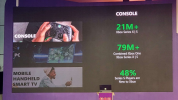The judge has some interesting questions
and
As opposed to now where a marketing deal with COD favors Playstation ?
Or you know any of the platforms ms have signed binding contracts with over the next 10 years.
Also it seems that Xbox brazil has released sales / shipped numbers for xbox series

So Xbox one has sold a maximum of 58m units.
It seems that Series S is doing good work for MS as 48% of those users are new to xbox.
FTC says it's about driving users to Game Pass. Then claims that ZeniMax is evidence of MSFT's incentive (to foreclose). Judge Corley: let's talk about ZeniMax? which ZeniMax title is comparable to CoD, multiplayer multiplatform title?
FTC says Elder Scrolls is most like CoD. But Judge Corley now notes that ES6 is not yet launched and FTC has to concede MSFT hasn't announced ES6 will be exclusive.
and
FTC now says one can always create a category of one. CoD is unique, only CoD generates huge revenues every year. Then talking about MSFT using content and Judge Corley then says "they*ll use that content to make money".
FTC says difference between exclusivity that is procompetitive and that is not. They say this is not about all exclusives being bad. If Sony gives someone money to make something unique, FTC says it's procompetitive. Money used to make something gamers want.
This is very much Sony can do no wrong from the FTC.FTC says acquiring content cuts off whole process of competition because you don't make an investment in something new. Judge wants to know harm to consumers.
FTC says there'll be content after the deal, timing issues, exclusives, that favor the Xbox, not the PlayStation.Judge: Let's talk about CoD. Why doesn't Sony acquire another publisher? They make a lot of stuff exclusive. Judge: If Sony actually had a deal for 10 years ...? FTC said they'd still investigate it. But, judge says, here it's about a preliminary injunction (not merely an investigation).
As opposed to now where a marketing deal with COD favors Playstation ?
udge: so the console market then comes really down to CoD and the concern that MSFT will partially foreclose it in a way that people who played it on PS will now have to play it on MSFT (Xbox)?
FTC: yes, one theory is they'll have to buy an Xbox. That*s theory. But other theories are myriad ways to use content to push platform.
Or you know any of the platforms ms have signed binding contracts with over the next 10 years.
Judge now wants to discuss total foreclosure theory. Wants to know how FTC expert Prof Lee came up with that 20% figure (switching rate in foreclosure scenario) that is the key input into his model.
Judge: I just wanna know what actual data ... I*ll tell you, Dr. Bailey looked at actual real-world data
Also it seems that Xbox brazil has released sales / shipped numbers for xbox series

So Xbox one has sold a maximum of 58m units.
It seems that Series S is doing good work for MS as 48% of those users are new to xbox.

